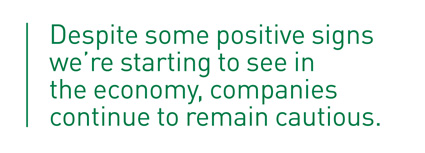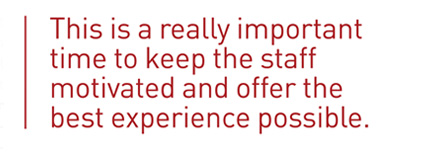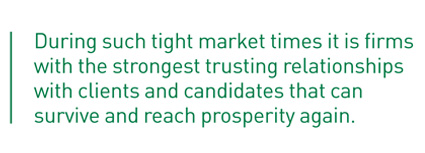A year after the onset of the worst global recession in half a century, how are Japanese businesses faring, and what does the future hold?
by Anne Roberts
As early as this summer, analysts and financial leaders began making bold assertions that the recession had ended and the global economy was on its way back up. On September 15 US Federal Reserve chairman Ben Bernanke told a conference in Washington, D.C. that, “From a technical perspective, the recession is very likely over at this point.” While skeptics viewed this statement as premature, New York University professor Nouriel Roubini echoed Bernanke’s stance on October 2, saying that there is “light at the end of the tunnel.”
To be fair, both Bernanke and Roubini qualified their statements with cautionary words about a slow recovery and continuing unemployment in the US. On the same day as Roubini’s speech, the managing director of the International Monetary Fund (IMF), Dominique Strauss-Kahn, warned that, “We will be dealing with the aftermath of the crisis for years to come.”
But what does all this mean for Japan, one of the countries that has reportedly been hit hardest by the global economic downturn? And, more importantly, what does it mean for business leaders, entrepreneurs, workers and jobseekers here?
Melinda Tarrant, president and CEO of American Express Nippon Travel Agency, observes that, “Despite some positive signs we’re starting to see in the economy, companies continue to remain cautious.” Her business looks after the needs of corporate travelers, whose numbers have decreased over the past year. “We’re witnessing the majority of companies upholding the stringent travel policies they enacted at the start of the downturn, which means they are maintaining lower levels of spending across corporate travel. We encourage companies to remember that the factors that made business travel essential in the ‘good times’ remain essential in the ‘tough times.’ Travel is a business enabler, allowing companies to grow market share, do business deals, and strengthen relationships. Business travel is a requirement to operate in this global world, and as such companies should view it as an investment and not a discretionary expense.” This counterintuitive policy of investing more during hard times is something that Tarrant has implemented in her own business as well. In addition to the standard cost-cutting programs undertaken by the majority of companies, “We have taken the opportunity to invest in areas which have the ability to transform our business over the next few years; we have enhanced our sales and account management capabilities, and are investing in new technology for process improvement and to meet our customers’ changing needs.”
This seems to be a trend amongst companies in the travel business that have continued to succeed even when faced with the worst financial crisis in postwar history. British Airways’ manager of Japan and Korea, Vishal Sinha, notes that although the company has cut costs by over six percent over the past year, this has not impacted its overall efficiency. “In fact, our best ever Q1 punctuality performance has been reflected in record customer satisfaction levels, with more than 75 percent of customers indicating that they are extremely or very satisfied with us.” Following its core belief in customer satisfaction, BA also continues to invest in training and services, and has recently launched a special business class only long-haul route from London City airport to New York’s JFK. With a capacity of just 32 passengers, this route caters mainly to business travelers and offers a uniquely personal experience.
Like the travel industry, the hospitality and restaurant business has also been dealt a strong blow by the recession. Satbhag ‘Paul’ Warraich, president of the Moti chain of Indian restaurants, says that his business has declined by over 20 percent since the onset of the economic slowdown, and so far he isn’t seeing any signs of improvement. “A lot of corporations are cutting down their costs and are not coming out for entertainment or throwing any parties. Even individuals are not willing to spend money.” Warraich is confident that this is not limited just to his chain or to ethnic restaurants in general. “I have spoken with my friends who are operating restaurants of different cuisines, and everyone is suffering the same because people are not willing to come out, especially for dinner.”
When asked what measures he has been taking to try to counteract the effects of the recession, Warraich said quality is key. “We are maintaining our food standards, keeping our portions the same, and keeping the old, popular menus.” Lauren Shannon, veteran of Roti and Fujimamas and owner of the newly opened Kimono Wine Bar in Nishi Azabu, agrees. “Restaurants get sloppier when it’s slow. This is a really important time to keep the staff motivated and offer the best experience possible.”
This commitment to quality and innovation during hard times is echoed across other consumer-centric industries as well. Atul Parekh and Kazuo Ogawa run Taj Enterprise, one of Japan’s leading fine jewelry companies. “Since our product is ultimately meant for the consumer, if the consumers are affected by the global recession, the business obviously undergoes adverse changes,” says Parekh. “However, for some people, buying jewelry involves many sentiments, and historically gems and jewelry have always helped in restoring personal confidence in times of adversity. If the product is unique and appealing, there is always an interest, and one needs to find the best approach to reach out to the people with innovative marketing efforts.”
Parekh and Ogawa have acted by introducing new lines that don’t rely on trends, but on other, more long-lasting qualities. “We have found that creatively designed, well crafted, exotic jewelry from India appealed strongly to many,” says Parekh. “But it takes time, and a great deal of resilience and hard work [is required] to overcome the intrinsic problems that all consumers face in such times of a general depression.” Ricky Sarani, owner of a custom tailoring and formal wear rental business in Tokyo, has seen a shift in his customers from primarily expats to mostly (75 percent) Japanese. “These days many people in the foreign community are teachers and café, pub and restaurant owners, many of whom don’t need suits or buy locally available ones for around ¥20,000. Many international companies have replaced foreign executives with Japanese bosses instead.”
While the recession has affected all countries and all industries, some businesses, such as IT and technology, are faring somewhat better than others. V. Sriram of Infosys Technologies attributes his company’s success during this time to two major elements: a variable cost structure that can be managed in line with the expected demand, and having relevant information in real time in order to have the ability to make (and change) decisions as events unfold. “Infosys has also taken the opportunity to build further in terms of newer…service offerings to ensure that the corporation is ready to support clients in the current economic climate. This includes new offerings that allow the client to have a variable cost structure through innovating pricing models,” says Sriram.
The recruiting industry, particularly companies that mainly served financial firms, took a huge hit in Japan when the bottom fell out of the economy. But some industry insiders, such as Pam Thai, general manager of Slate Consulting, are starting to see things slowly picking up. “We have all seen the disappearance of the more rigid search firms, as well as firms who could not provide a truly professional and value added service to clients. During such tight market times it is firms with the strongest trusting relationships with clients and candidates that can survive and reach prosperity again. We have been fortunate enough to have the flexibility to adjust to the very different market needs of today, and there certainly has been a lot more activity in the recruitment sector now than there was during the first half of this year,” says Thai.
So with such a large number of business leaders tackling the recession head on, can we expect the economy to quickly return to where it was just over a year ago? Not according to Erik Gain, a longtime entrepreneur in Japan (and now China). “As I keep telling my friends and colleagues, I don’t think this ongoing recession, mild depression, or however we label it, is a temporary downturn, something that will eventually go away and return things to business as usual. But rather this is the beginning of a new economic landscape, and one in which we need to learn the new rules quickly in order to survive and prosper.”
Whether these rules include keeping costs down, increasing value or both, one thing, at least, is clear. Now that the toughest of Japan’s expat business leaders have lasted this long and grown smarter and stronger for it, it’ll take more than a few slow months to stand in their way. End of recession or not, these execs won’t let themselves go down without a fight.










